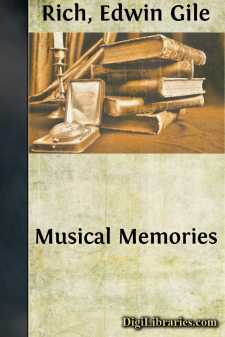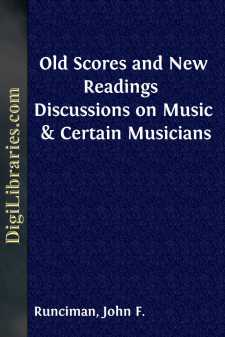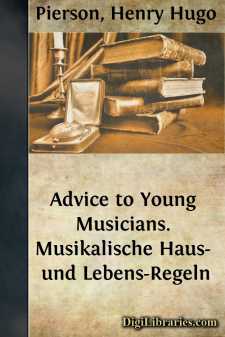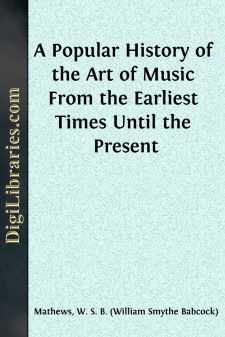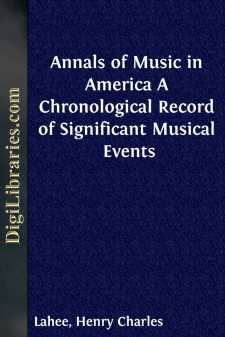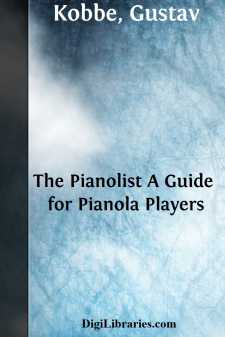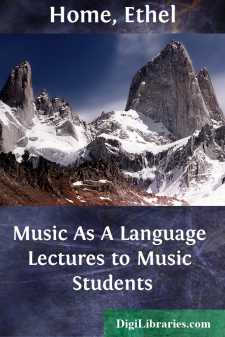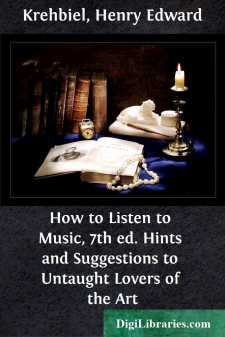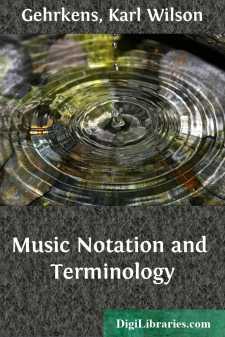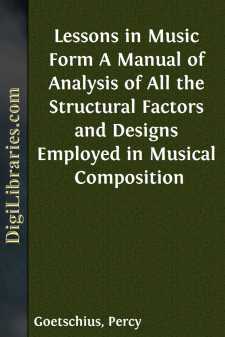Music
Music Books
Sort by:
by:
Edwin Gile Rich
Memories of My ChildhoodIn bygone days I was often told that I had two mothers, and, as a matter of fact, I did have two—the mother who gave me life and my maternal great-aunt, Charlotte Masson. The latter came from an old family of lawyers named Gayard and this relationship makes me a descendant of General Delcambre, one of the heroes of the retreat from Russia. His granddaughter married Count...
more...
by:
John F. Runciman
Many years ago, in the essay which is set second in this collection, I wrote (speaking of the early English composers) that "at length the first great wave of music culminated in the works of Tallis and Byrde ... Byrde is infinitely greater than Tallis, and seems worthy indeed to stand beside Palestrina." Generally one modifies one's opinions as one grows older; very often it is necessary...
more...
The cultivation of the Ear is of the greatest importance.—Endeavour early to distinguish each several tone and key. Find out the exact notes sounded by the bell, the glass, the cuckoo, etc. Practise frequently the scale and other finger exercises; but this alone is not sufficient. There are many people who think to obtain grand results in this way, and who up to a mature age spend many hours daily in...
more...
INTRODUCTION. I. HE name "music" contains two ideas, both of them important in our modern use of the term: The general meaning is that of "a pleasing modulation of sounds." In this sense the term is used constantly by poets, novelists and even in conversation—as when we speak of the "music of the forest," the "music of the brook" or the "music of nature." There...
more...
1640-1750 The Annals of Music in America during the first hundred years contain very little that would seem to be of any importance to the musicians of today. Nevertheless it is as interesting to note the beginnings of music in this newly settled country as to watch the appearance of the baby's first tooth. The first settlement at Plymouth took place in 1620, and we find that in 1640 the colonists...
more...
by:
Gustav Kobbe
I. THE TITLE AND PURPOSE OF THIS BOOK My book, "How to Appreciate Music," in the chapter devoted to the pianoforte, contains a paragraph relating to the Pianola and its influence in popularizing music and stimulating musical taste. I confess that before I started that paragraph I was puzzled to know what term to use in designating the instrument I had in mind. "Mechanical piano-player"...
more...
by:
Ethel Home
CHAPTER I THE TRAINING OF THE MUSIC TEACHER Let us consider the case of a young girl who has finished her school education, and has supplemented this by a special course of technical work in music, which has ended in her taking a musical diploma. She now wishes to teach. What are the chief problems which she will have to face? She must first of all make up her mind whether she wishes to confine her...
more...
IntroductionThe book's appeal.This book has a purpose, which is as simple as it is plain; and an unpretentious scope. It does not aim to edify either the musical professor or the musical scholar. It comes into the presence of the musical student with all becoming modesty. Its business is with those who love music and present themselves for its gracious ministrations in Concert-Room and Opera...
more...
PREFACE The study of music notation and terminology by classes in conservatories and in music departments of colleges and normal schools is a comparative innovation, one reason for the non-existence of such courses in the past being the lack of a suitable text-book, in which might be found in related groups clear and accurate definitions of the really essential terms. But with the constantly increasing...
more...
by:
Percy Goetschius
CHAPTER I. INTRODUCTION. THE NECESSITY OF FORM IN MUSIC.—So much uncertainty and diversity of opinion exists among music lovers of every grade concerning the presence of Form in musical composition, and the necessity of its presence there, that a few general principles are submitted at the outset of our studies, as a guide to individual reflection and judgment on the subject. Certain apparently...
more...


